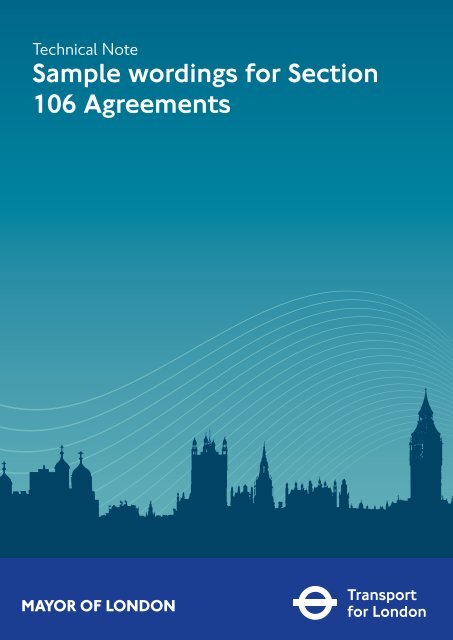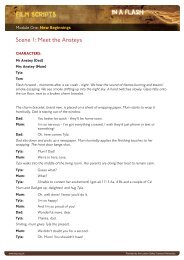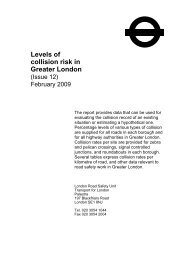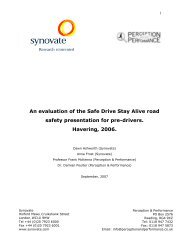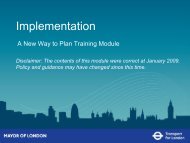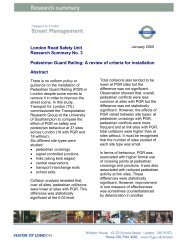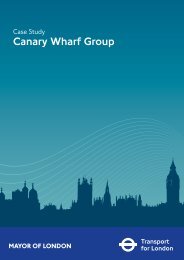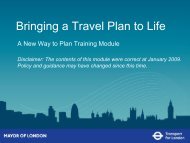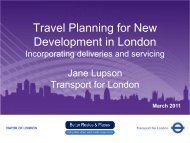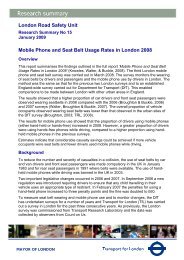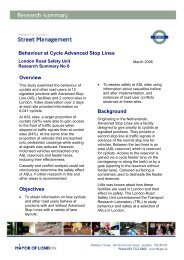Sample wordings for Section 106 Agreements
Sample wordings for Section 106 Agreements
Sample wordings for Section 106 Agreements
Create successful ePaper yourself
Turn your PDF publications into a flip-book with our unique Google optimized e-Paper software.
11/01/10 <strong>Sample</strong> <strong>wordings</strong> <strong>for</strong> <strong>Section</strong> <strong>106</strong> <strong>Agreements</strong>11. IntroductionTravel plans should ideally be secured via <strong>Section</strong> <strong>106</strong> <strong>Agreements</strong> in order to ensure that theyare implemented as planned. The wording used in S<strong>106</strong> <strong>Agreements</strong> can vary widely and theissues / items referred to as part of the Agreement can also be diverse.This note sets out sample <strong>wordings</strong> <strong>for</strong> <strong>Section</strong> <strong>106</strong> <strong>Agreements</strong> that are considered to begood practice, and also clauses which have been used by local planning authorities across thecountry (within and outside London). The purpose of the note is to illustrate the wide varietyof wording used, to illustrate how agreements can be used to secure very specific things, andalso to highlight examples which are considered to be best practice. It is important to notehowever that the examples presented are not exhaustive, and that any agreement will need tobe adapted to suit the circumstances of any particular case, utilising the relevant legal advice toensure that they are appropriate and robust.The examples presented in this note have primarily been drawn from the following sources:• Department <strong>for</strong> Transport’s good practice guidelines: Good practice Guidelines <strong>for</strong> deliveringtravel plans through the planning process;• Transport <strong>for</strong> London’s Guidance <strong>for</strong> workplace travel planning <strong>for</strong> development;• Warwickshire County Council’s practice note <strong>for</strong> developers: Specimen clauses <strong>for</strong> a <strong>Section</strong><strong>106</strong> planning obligation;• London Borough of Hillingdon’s pre-application advice note and S<strong>106</strong> wording extract;• London Borough of Sutton’s Supplementary Planning Document: Transport Assessments andTravel Plans’.2. Good practice s<strong>106</strong> clausesDepartment <strong>for</strong> TransportGood practice Guidelines <strong>for</strong> delivering travel plans through the planning process publishedby the DfT in April 2009 recommends that planning obligations should clearly set out thefollowing:• the overall outcomes to be achieved by the travel plan;• the indicators and targets;• measures to be implemented (depending on the type of travel plan and stage reached);• the process by which such indicators and related targets, and any other measures, are to bedetermined, if not already set out in the travel plan;• the process <strong>for</strong> the monitoring and review of such indicators and related targets, and othermeasures;
11/01/10 <strong>Sample</strong> <strong>wordings</strong> <strong>for</strong> <strong>Section</strong> <strong>106</strong> <strong>Agreements</strong> 32• any sanctions where the targets and/or indicators are not being met, and how and when theyshould be imposed;• any procedure <strong>for</strong> the variation by means of amendment, substitution and/or addition, ofsuch targets and/or indicators, or other measures;• the person(s) or organisation that will prepare the travel plan (if not submitted), manage andthereafter be responsible <strong>for</strong> its management and maintenance, including the relationshipwith the local planning authority and/or the highway authority/ies and/or other keystakeholders.The Guidance also sets out as an appendix, sample wording of planning obligations consideredto be good practice - see Appendix C of the following document:[http://www.dft.gov.uk/pgr/sustainable/travelplans/tpp/goodpracticeguidelines-main.pdf].These are also replicated in Appendix A of this document.The illustrative clauses provided show how a wide range of issues and items can be addressedseparately, such as:• Appointment of the travel plan coordinator• Bus service contributions - including phasing and sums of money• Parking survey and controlled parking zones• Car clubs• Personal travel planning• Parking permit capping• Parking management plans• Modal shift and monitoring, including definitions of terms used• Vehicle trip monitoringTransport <strong>for</strong> LondonIn its Guidance <strong>for</strong> workplace travel planning <strong>for</strong> development, TfL sets out as Appendix 10a draft planning obligation to provide some assistance in drafting suitable arrangements <strong>for</strong>securing an effective travel plan. This wording is primarily focused around the travel plan andtargets, rather than detailed clauses relating to individual measures as in the above example,butalso includes a clause requiring the submission of a per<strong>for</strong>mance bond.
11/01/10 <strong>Sample</strong> <strong>wordings</strong> <strong>for</strong> <strong>Section</strong> <strong>106</strong> <strong>Agreements</strong>4It is also possible <strong>for</strong> S<strong>106</strong> clauses to be very prescriptive about specific requirements, in effectsetting out minimum standards. For example, the TfL draft obligation sets out the numberof years’ experience in travel plan monitoring that the individual appointed to monitor thetravel plan is required to have, and also requires that that individual owes identical duties ofresponsibility both to the developer (their employer) and the Council. A copy can be seen here.The clauses are also replicated at Appendix B.3. Securing financial penalties <strong>for</strong> non-achievement oftargetsIn its guidance <strong>for</strong> developers, Warwickshire County Council states that a developer will berequired to enter into a S<strong>106</strong> agreement with the council which at a minimum will normallyinclude the following:• A requirement to produce a travel plan• A requirement to appoint a travel plan coordinator• The target• The contribution• The monitoring requirements• Provisions in relation to speculative development, multi occupation and future occupierswhere applicableIn a separate Practice Note the County Council provides specimen clauses <strong>for</strong> a <strong>Section</strong> <strong>106</strong>planning obligation, including a clause which sets out what financial penalties are payable in theevent that the number of cars being used (identified through monitoring) exceeds the targetfigure. The clauses set out how the remedial payment is to be calculated (based on a startingsum, an inflation factor and the amount and period of the excess) and the payment terms,including interest charged <strong>for</strong> late payment. A copy of the specimen clauses can be found hereThe clauses are also replicated at Appendix C.4. Use of bonds to secure travel plan surveysPre application advice provided to developers by the London Borough of Hillingdon statesthat the Council will require a financial bond to be deposited in an account to ensure thatmonitoring and reporting requirements set out in travel plans (Hillingdon requires a minimum10 year monitoring period) are undertaken and completed as planned. The amount of the bondvaries, but is usually a sum of around £20k. The S<strong>106</strong> wording states that the bond (or part ofit) will be used by the Council to cover the costs it incurs in undertaking the travel plan surveys


